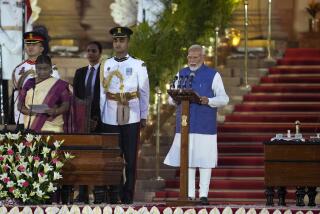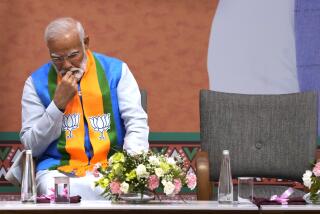Veteran Consensus-Builder to Guide India
- Share via
TUNDLA, India — The slight, sleepy man wearing a cotton loincloth rubbed his eyes as he awoke, looked out the window of the railway car and then turned to a reporter to explain how a little-known leader like himself could take charge of India’s largest political party--and the Indian nation.
“In India, this is a complicated thing. You have to live it to understand it,” P. V. Narasimha Rao said three weeks ago, as he and other Congress-I Party leaders accompanied the ashes of their slain former prime minister, Rajiv Gandhi, across the country.
“We have lots of families in India in which the head of the family is not the strongest or the most respected, but still the family stays together and rallies around the family head,” he said. “The family, you see, for its own cohesion, its own necessity and its own survival, stays together.”
So it was Thursday. After a prolonged debate to resolve a crisis that began with Gandhi’s assassination, Congress-I chose gentle, soft-spoken, diplomatic but undynamic party elder Rao to lead it and the country through its darkest modern hours.
When Rao, 69, is sworn in today, he will assume the leadership of a nation torn by religious hatred, caste feuds, secessionist wars and one of the worst economic crises in India’s 44 years of independence.
It is Rao’s ability to listen, to negotiate and to forge consensus, combined with his decades of experience as a legislator, a government minister and a party loyalist, that convinced his party’s leadership and that of the opposition, too, that he is India’s best hope for an uncertain future.
Variously called, “the Compromiser,” “the Consensus Man,” “the New Old Guard” and, to his friends, simply, “P. V.,” India’s next prime minister has had a political career so conventional and uncontroversial that the harshest criticism leveled at him is that he is prone to ambivalence and indecision.
“Those given to cruelty say that (Rao) has never displayed more than an anatomical interest in his backbone, that he is a weak man who has never taken a firm stand, but remained true and blue to his leader,” observed the Indian Express newspaper, a longtime critic of Gandhi’s family and the autocratic way it ruled the Congress-I after Gandhi’s mother, Indira, inherited the mantle from her father, Jawaharlal Nehru.
An episode of apparent weakness most often cited by Rao’s critics occurred during his term as minister for internal security. In the wake of Indira Gandhi’s assassination by two Sikh bodyguards, Rao was accused of standing idly by while rampaging Hindus killed at least 2,000 Sikhs.
More recently, Jaipal Reddy, a longtime personal friend of Rao’s family and currently the spokesman for the opposition National Front, said of the next prime minister: “His first nature is to be second-in-command. His second nature is to play safe.”
After a career that included eight successful campaigns for Parliament, Rao did not run in the elections just ended. But he can serve as prime minister if he wins a by-election within six months.
Rao brings many assets to his new role. He speaks at least 10 languages fluently, among them English, French, Arabic, Persian and five main Indian dialects. This talent helped him earn a reputation as one of India’s best foreign ministers, a post he has held twice.
During the decades that he loyally served three generations of Nehru/Gandhi family leaders, Rao also has held the portfolios of defense, human resources, health and education.
Rao’s career reflects his flexibility in lesser-known ways. Soon after Rajiv Gandhi, a professional pilot, took office, Rao took up flying lessons. He installed three computers in his New Delhi home, inspired by Gandhi’s plan to use technology to push India into the 21st Century.
“Some of us get away with the feeling that we know everything,” Rao once said of his fellow old-guard party leaders. “But with Rajiv, we have been forced to reverse our beliefs.”
More to Read
Sign up for Essential California
The most important California stories and recommendations in your inbox every morning.
You may occasionally receive promotional content from the Los Angeles Times.













